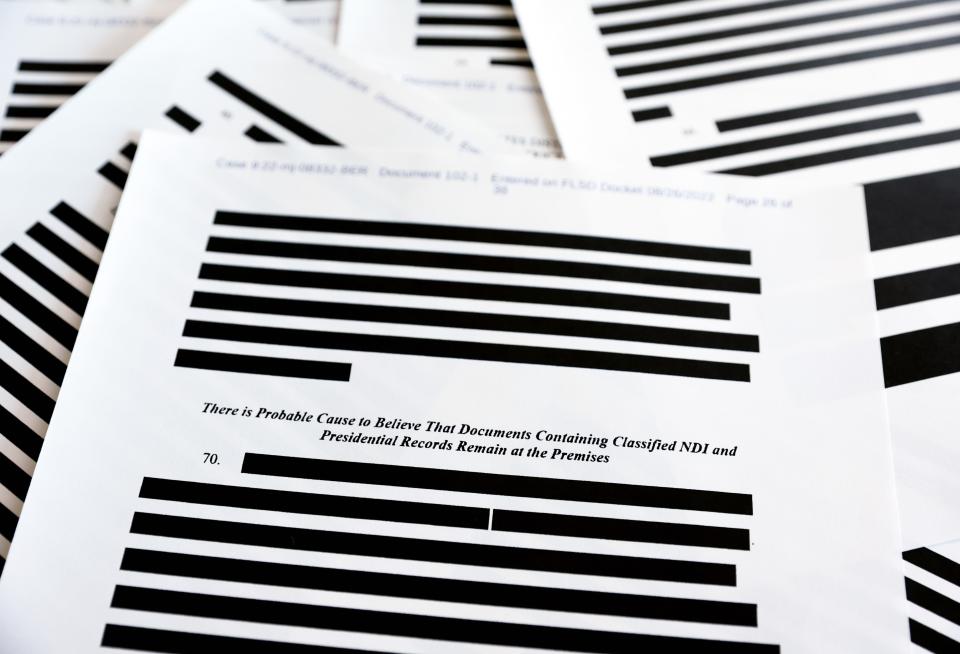Trump has argued he declassified Mar-a-Lago documents. For his legal defense, it might not matter
- Oops!Something went wrong.Please try again later.
After the Justice Department released a singularly rare photo showcasing folders labeled "top secret" and "secret" on the floor at Donald Trump’s Mar-a-Lago estate, the media and the public zoomed in on what it could all mean.
The former president has said he had a standing order to "automatically declassify" all documents he took home and made it core to his defense, accusing the government of overreach after the FBI searched his Florida home.
But whether or not Trump's claim is true – and whether or not the documents are classified or even declassified – for his legal defense right now, it may not matter, experts told USA TODAY.
That's because the federal laws used to justify the Aug. 8 search do not require the documents to be classified for a crime to be committed. In fact, the provisions of federal law contained in the Espionage Act, obstruction, and the mishandling of government records and reports mentioned in the search affidavit don't even include the words "classified" or "confidential." The first two carry the heftiest penalties of fines and up to 10 and 20 years in prison, respectively.
In approving the search warrant, a federal magistrate agreed that there was probable cause FBI agents would uncover evidence that these three provisions of federal law were violated.
Trump’s legal team on Monday reiterated the broad argument that Trump had the power to declassify information in a filing opposing the Justice Department's effort to keep documents labeled as "classified" from being handed over to a special master, or neutral third party, for review.
"The president enjoys absolute authority under the executive order to declassify any information," the filing states. And, it added, there's no legitimate claim that it requires approval of "bureaucratic components of the executive branch."
Experts say it's not that simple.
'Astounding': Trump documents reveal casual disregard for long-standing security protocols
'National defense materials'
Today's modern classification system was created years after the 1917 Espionage Act, said Jim Trainor, a former FBI counterintelligence agent who served as assistant director for the cyber division.
That's why the section cited by the DOJ refers to "national defense" materials, he added.
"The Espionage Act doesn't define what national defense information is," a recent Congressional Research Service report noted, adding that courts all the way up to the Supreme Court have laid out some general principles: that such information typically relates to the military and naval establishments and national preparedness; that the information must be closely held; and that disclosure must be potentially damaging to the nation.
"My sense is they (the DOJ) didn't want to go down this rabbit hole as to whether the documents are classified or not," Trainor said.
Still, that doesn't mean the Justice Department can't later decide to seek an indictment based on other statutes, Trainor said.

Trump’s own former Attorney General Bill Barr said that broadly proclaiming all documents removed to the White House residence declassified by default without telling anyone would be highly “reckless” given that American agents, their families and the nation's hard-won foreign assets could be exposed.
'Immediate and serious harms'
In a court filing last week, the DOJ noted that providing seized classified records to a special master could cause "the most immediate and serious harms to the government and the public." The DOJ said it had identified "a discrete set of just over 100 documents," or more than 700 pages, that it called classified records belonging to the government and part of an ongoing criminal investigation.
FBI agents also removed from Trump's office and storage room more than 11,000 government documents and photos without any classification markings mixed in with some of the nation's most highly-guarded secrets, according to court filings.
The Office of the Director of National Intelligence is conducting its own review of the national security risk of possible unauthorized disclosure of these classified records and any harm that may have occurred, according to DOJ court filings.
A grand jury subpoena on May 11 also laid groundwork for the Mar-a-Lago search in August. The subpoena, received by Trump attorney Evan Corcoran, essentially put Trump on notice that there was an official government request for national defense materials, said Jamil Jaffer, who worked at White House counsel’s office under President George W. Bush and helped send highly classified documents to the National Archives and Records Administration as part of the administration’s transition.
Because, the DOJ affidavit noted, the Espionage Act provision includes the "unauthorized possession" of information relating to the national defense that's "willfully" kept from a U.S. government representative entitled to receive it, the Justice Department can now argue Trump indeed "willfully" kept those materials, especially after his attorney signed a sworn certification saying Trump had not retained materials the government requested, Jaffer said.
The DOJ Mar-a-Lago photo: What can we see in the rare photo? What does it mean?
'Not with the Department of Justice'
Trump and his attorneys have argued that the seized materials are all governed by the Presidential Records Act, allowing the president discretion to categorize his records as presidential or personal – with limited judicial oversight on the issue.
"At best, the government might ultimately be able to establish certain Presidential records should be returned to NARA (the National Archives and Records Administration)," the Sept. 12 filing states. "What is clear regarding all of the seized materials is that they belong with either President Trump ... or with NARA, but not with the Department of Justice."
The second statute in the affidavit refers to trying to impact or obstruct government workings, including, in this case, the Archives, Jaffer added.
Trump's attorneys did not provide a comment.

But it remains unclear if the DOJ would prosecute Trump.
That's because the DOJ might simply take the view that getting the documents secured is enough, said Jaffer, who also worked on these issues at the DOJ's National Security Division.
National security experts say the DOJ is in a tough spot not only because of the political timing and optics, but also because such a move may send the wrong message to other intelligence workers – both those who understand they would face prosecution without hesitation in a similar circumstance, as well as future presidents and senior officials who may be emboldened to do as they want with state secrets.
Trump is also not any government employee, but a former commander-in-chief who had the power to issue executive orders and declassify materials. Jaffer noted that plenty of senior government officials, including the president himself, have made classified information public as an attempt to better inform the public about national security issues; they are not prosecuted, even when it is done in an informal manner.
And when Trump tweeted a sensitive picture of the aftermath of an accident at an Iranian space facility, he also wasn’t prosecuted, nor was there any public suggestion from the DOJ that he ought to be.
The DOJ may decide that no further threat to national security is enough, taking a page from former special counsel Bob Mueller's investigation into Russian election interference, Jaffer said. That would leave the information in the hands of the American people, again, to decide for themselves.
This article originally appeared on USA TODAY: In Mar-a-Lago search, classified documents is not core issue for Trump

